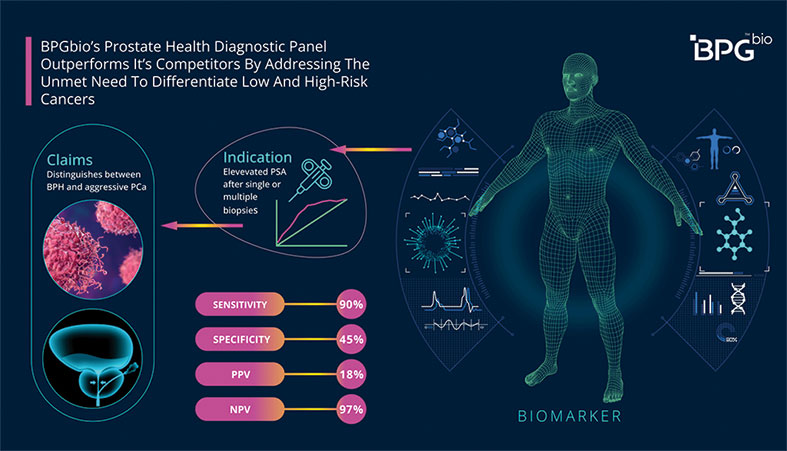First of Its Kind AI-Guided Test Distinguishes Prostate Cancer from Benign Prostatic Hyperplasia
Posted on 30 Jun 2023
A pioneering diagnostic panel, developed using artificial intelligence (AI), offers a non-invasive, non-PSA-based screening test for prostate cancer. The test can differentiate prostate cancer from benign prostatic hyperplasia (BPH) cases and also rule out aggressive prostate cancers, preventing unnecessary biopsies in men with BPH who typically present with elevated prostate-specific antigen (PSA).
BPGbio, Inc. (Framingham, MA, USA) has developed a prostate cancer screening test using proprietary technology, which employs AI to analyze tissue and blood samples and distinguish between healthy and cancerous samples. BPGbio's technology is based on its Interrogative Biology platform that combines AI with a comprehensive biobank of patient samples to identify potential biomarkers. The company then uses the unique biomarkers discovered to create diagnostics and screening tests, such as for prostate cancer. This biobank has been built over 12 years through collaborations with hospitals and medical schools and includes blood samples, tissues, and demographic data.

The biomarkers are detected de novo using data generated through internal analysis and the company's analytics tools. Depending on their interconnections in the data knowledge graphs created by BPGbio, these markers are further evaluated for their potential diagnostic capability. They are also examined to ascertain whether they are affected by demographics, comorbidities, or concurrent medications. The markers being examined are diverse, encompassing genetic mutations, gene expression, protein measurements, structural lipids, signaling lipids, metabolites, and protein post-translational modifications like phosphorylation or acetylation.
BPGbio developed the mass spectrometry-based blood test after analyzing tissue and samples collected quarterly for over 20 years from soldiers to discover a novel biomarker, filamin-A. This biomarker can differentiate between BPH and aggressive prostate cancer in patients with elevated PSA levels. Filamin-A interacts directly with the androgen receptor, linked to prostate cancer proliferation and progression, and is involved in calcium signaling, which activates prostate cancer progression pathways. BPGbio has completed late-stage clinical trials for the prostate cancer test and is presently determining how to best commercialize it in the US and internationally, particularly in Latin America and India.
Additionally, BPGbio is leveraging its technology to develop a similar breast cancer test, along the lines of its successful prostate cancer test. The new AI-developed panel aims to identify women diagnosed with ER+ breast cancer who do not respond to hormone therapy, enabling them to avail more effective treatment options. Through its research, the company has identified 34 genes that could provide deeper insight into the cancer's metastatic potential than pathology. The awareness of these genes can encourage clinicians to treat patients more aggressively for whom hormone therapy is likely to be ineffective. While the prostate cancer test is close to being commercialized, the next-generation sequencing-based breast cancer panel is still in the prospective validation stage. The commercial breast cancer panel will likely include all 34 genes and other genes to normalize the signature.
Using similar methodologies for the development of its prostate and breast cancer tests, BPGbio is also working on diagnostic tests for pancreatic cancer and Parkinson's disease. The pancreatic cancer test will be blood-based, while the Parkinson's test will require blood and urine samples. The Parkinson's test has been validated in a CLIA-certified laboratory and is ready to be launched as a laboratory-developed test. In contrast, the pancreatic cancer test is in analytical development as BPGbio is validating its biomarkers.
Related Links:
BPGbio, Inc.













